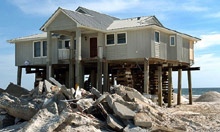Outside View: Prepare For Disaster
The glaring lesson in the aftermath of the
largest emergency response and relief effort in U.S. history following
Hurricanes Katrina and Rita is that it is far less painful and expensive to
prepare for disasters than to respond to them.

The glaring lesson in the aftermath of the largest emergency response and relief effort in U.S. history following Hurricanes Katrina and Rita is that it is far less painful and expensive to prepare for disasters than to respond to them.
We've seen the same lesson following earlier disasters, but have failed to learn it.
In 1988, for example, a magnitude 6.8 earthquake in Armenia killed at least 25,000 people. The next year, a more powerful 7.1 earthquake struck the densely populated San Francisco Bay area and killed just 62 people.
Why the staggering contrast? A building code imposing strict requirements on construction in earthquake-prone areas had prepared San Francisco far better than Armenia. Such requirements increase the cost of construction, but this is small compared with the human tragedy and economic losses that are prevented when an earthquake hits.
Insurance regs have long motivated preparation. US flood insurance requires homes with previous frequent inundation to be built on pilings. TV footage from Grand Isle, La, showed most of the homes built in that fashion survived better than in New Orleans or than the ground-built homes in SW La washed away by Rita.
There are several approaches to preparation. Zoning laws are used to control development in such hazard-prone areas such as flood plains and low-lying coastal areas susceptible to storm surge or tsunamis. Building codes are used to minimize damage from the forces of nature. Community-wide protection steps, such as the levees surrounding New Orleans, can also help minimize damage. And advances in prediction and diligent response planning can help facilitate evacuations, get people into shelters and protect valuable infrastructure.
------------
Investing up front to avoid paying a lot more later is not a profound insight, nor is the tendency to ignore this advice. We hope the tragedy of Katrina will inspire America not simply to rebuild New Orleans, but to design a future where the probability of such enormous disaster occurring again is a great deal lower. While we all hope for the best when a disaster strikes, it is important to prepare for the worst.
Politicians across the political spectrum are cranking up “blame analysis”. What’s required is advancing preparation, infrastructure and prevention.
Posted: Wed - September 28, 2005 at 07:36 AM